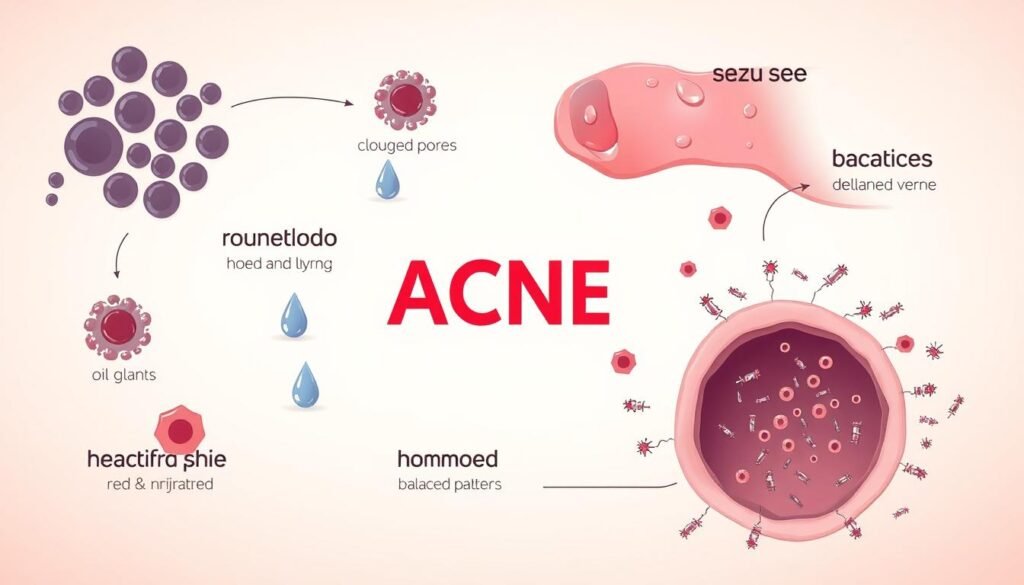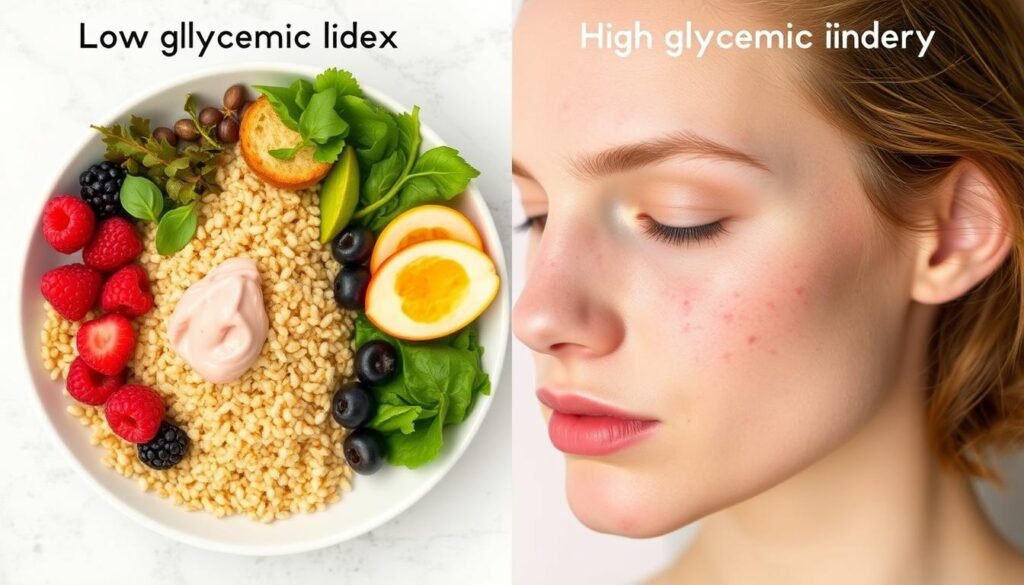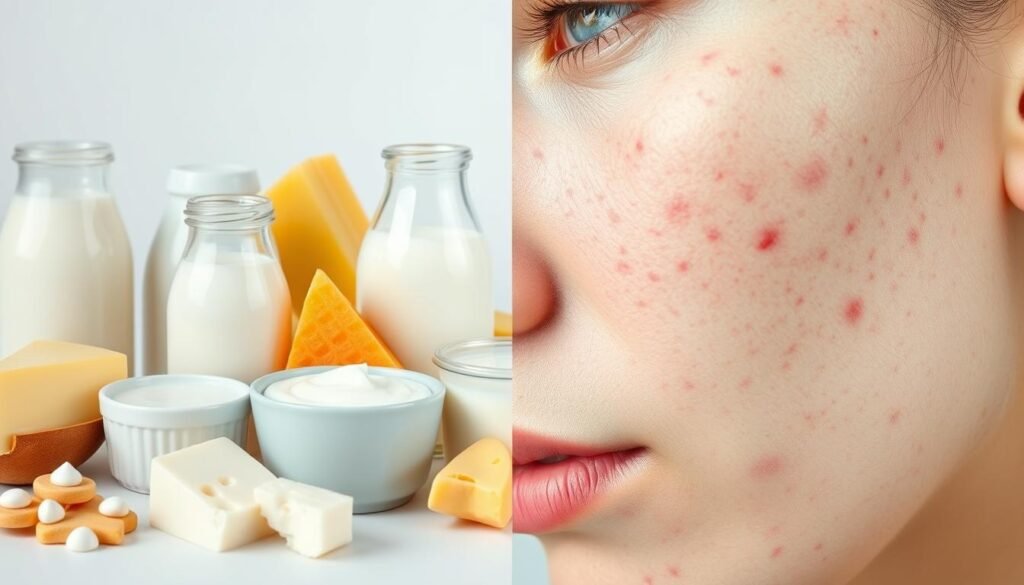Acne is a big problem that affects about half of the people between 20 and 29. Studies show that what we eat, like high-glycemic foods, dairy, and refined sugars, could trigger acne. This creates a lot of confusion about what to eat for healthy skin. This article will look at how diet and skin health are connected. It will also talk about how important it is to see a health professional for advice. Knowing how diet impacts acne can lead to better skin health and feeling better overall.
Adopting a balanced diet is key to handling acne. Choose nutritious foods and avoid those that might cause breakouts.
Want to learn more about how food affects your skin? Check out this article for the latest research and expert advice: What’s the Truth About Food and Acne.
Key Takeaways
- Acne affects millions, especially young adults, showing how common it is.
- Diets high in glycemic index and some dairy products might make acne worse.
- Getting enough vitamins like A and D is important for skin health.
- Eating balanced meals could help keep blood sugar steady and reduce acne.
- There’s still a lot of wrong info about diet and acne out there.
- Talking to healthcare experts can help find the right way to treat acne.
The Connection Between Diet and Acne
The link between what we eat and acne is attracting lots of interest. It’s a hot topic among scientists, skin doctors, and those who want clear skin. Acne is a common skin issue in places like the USA, France, and Great Britain. The connection between our meals and our skin health is getting clearer. Some studies have found that what we eat might affect acne.
Acne often affects teens, but it can show up at any age. It hits everyone equally, regardless of gender. For some, it goes away as they grow older. For others, it stays into adult years. Eating a lot of refined carbs and sugars can lead to more acne, research says. Skim milk might also cause trouble, possibly because it makes the body produce more skin oil.
It’s not just dairy that’s a problem. The Western diet, rich in processed foods, might worsen skin health. High-sugar foods like white rice and sweet drinks can make blood sugar levels spike. This can make the skin produce more oil and increase acne risks.
However, not everyone with acne seeks help from a doctor. Many try to fix it with home treatments. Also, acne affects different races in various ways. African-Americans and Asians tend to get it less than Caucasians do.
For a full understanding of how diet affects acne, we need more research. It’s important to find out which foods can harm or help our skin health in the long run.
Understanding Acne: Causes and Types
Acne develops due to many factors. It can appear in different forms and affects people of all ages. This is especially true during puberty when hormones change a lot. These changes can cause more oil, blocked pores, bacteria, and swelling. These all play a big role in acne appearing.
Hormonal Changes and Acne
Hormones greatly affect how bad acne can get. During puberty, our bodies make more sebum. Women might see more acne before their period. For adults, a sudden acne increase could mean health issues. It’s important to keep an eye on any big changes.
Genetics and Acne
Our genes matter a lot in whether we get acne. If your family has acne, you might too. Your genes and how you live can change how severe your acne is. This can happen from your teen years into being an adult.
Environmental Influences
Things like pollution and certain skincare products can make acne worse. Some products can clog pores and increase acne. Knowing what triggers your acne can help you avoid it. This can lead to better skin.

How Nutrition Impacts Skin Health
Eating the right foods is key to keeping your skin healthy and glowing. Certain vitamins and minerals make your skin look great. A good diet helps improve skin issues, making it clear and reducing acne.
Vitamins and Minerals for Healthy Skin
Vitamins A, C, D, and E are great for your skin. Vitamin A keeps skin strong and is in carrots and spinach. Vitamin C, in fruits like kiwi, fights skin damage and is crucial for firm skin.
Vitamin D comes from fatty fish and boosts skin health. Minerals like zinc and selenium are also important. Zinc reduces acne, and selenium fights off skin damage.
Copper and iron are vital too. They help make collagen and keep cells working right.
The Role of Antioxidants
Antioxidants protect your skin from harm like UV rays and pollution. Eating foods rich in antioxidants, like fruits and dark chocolate, shields your skin. This guard helps fight off acne and other skin problems.
A balanced diet with lots of fruits, veggies, and lean proteins improves skin health. Choosing nutrient-rich foods makes your skin stronger and better-looking. It leads to a clearer face with less acne inflammation.
The Glycemic Index and Acne
Research is showing a clear link between the glycemic index and acne. What we eat affects our blood sugar and our skin’s health. Knowing the difference between high and low glycemic foods is key for managing acne.
High-Glycemic Foods and Their Effects
High-glycemic foods cause blood sugar and insulin to spike. This includes processed snacks, sweet drinks, and white bread. These spikes can make sebum production and inflammation worse, leading to more acne. A study found that people eating more of these foods saw a 16% improvement in acne.
But those on a low-glycemic diet saw better results.
Benefits of Low-Glycemic Foods
Eating low-glycemic foods like whole grains, beans, and fruits helps keep blood sugar stable. This is linked to a 26% betterment in acne in a study. A low-glycemic diet improves insulin sensitivity, calms skin inflammation, and reduces oil gland size.
Sticking to this diet can also change hormone levels for the better, reducing acne. To learn more about diet and skin health, see this literature review.

| Diet Type | Mean Glycemic Index | Facial Acne Severity Improvement | Insulin Sensitivity Change |
|---|---|---|---|
| High Glycemic Diet | 61 ± 2 | 16% | 0.1 |
| Low Glycemic Diet | 51 ± 1 | 26% | 0.2 |
Food Allergies and Acne Triggers
Understanding how food allergies affect your skin is key to handling acne. Allergic reactions can cause inflammation and lead to acne. It’s important to figure out which foods are causing these issues.
Identifying Food Allergies
Trying an elimination diet may help. This means cutting out one food at a time to see the effect. It takes time but helps in pointing out foods that cause acne. Keeping a food diary during this time is also a good idea.
Common Allergens Linked to Acne
Some foods are known to make acne worse. For example, dairy often triggers breakouts. People who eat a lot of dairy are more likely to have acne. Studies show that fast food and processed meats can also increase acne risks.
| Common Allergens | Potential Effects on Acne |
|---|---|
| Dairy Products | Increases risk of acne, linked to hormonal fluctuations |
| Gluten | May provoke inflammatory symptoms, contributing to breakouts |
| Refined Carbohydrates | Can lead to increased blood sugar and inflammation |
| Sugar | Heightens insulin levels, possibly exacerbating acne |
| Processed Meats | Increases the body’s inflammatory response, leading to acne |
Dairy Products: Friend or Foe?
The debate on dairy products and their link to acne is complex. Many adults face acne issues beyond their teenage years. This has sparked talks on how diet affects skin health. Studies suggest milk and dairy can lead to severe acne breakouts.
Research on Dairy and Acne
Studies on dairy and skin health have shown varying results. Some evidence points to dairy products increasing inflammation, thus affecting skin health. Fresh milk’s interaction with human genes could worsen acne. It can influence more than 11,000 genes.
Despite dairy’s low glycemic index, too much can cause inflammation. Moreover, proteins like whey in milk might link to acne in some people.
Individual Reactions to Dairy
How dairy affects acne varies from person to person. Individuals drinking low-fat or skim milk often report more breakouts than those drinking whole milk. Fermented dairy products like milk kefir could reduce inflammation and benefit gut health.
Those worried about dairy’s impact should seek advice from healthcare experts. Companies such as Géomer focus on skin solutions for dairy-related problems.

Processed Foods and Inflammation
Processed foods are common in today’s diets but they can harm our health. This is especially true for skin problems like acne. These items usually have a lot of refined sugars and bad fats.
These ingredients may cause long-term inflammation. Knowing how this works can help us choose healthier foods. This can lead to better skin.
Understanding Inflammation and Acne
Long-lasting inflammation plays a big role in how severe acne can get. Studies show eating a lot of processed foods and sugar can make inflammation worse. This can make acne problems bigger.
Omega-6 fatty acids, which are plenty in processed foods, tend to make inflammation and skin issues worse. On the other hand, eating foods that fight inflammation can help control acne. This can make a big difference.
Healthier Alternatives to Processed Foods
Making a switch to healthier food options can really help your skin. Focusing on whole foods like fruits, veggies, nuts, and fatty fish can lessen inflammation. This can make your skin look and feel better.
Adding foods rich in Omega-3 fatty acids, like fish and flaxseeds, also helps. They can fight the negative effects of processed foods on your skin and acne.
Diet and Acne: Myths and Misconceptions
Many people misunderstand how food affects acne. They often blame chocolate and fatty foods for causing breakouts. It’s key to debunk these myths to handle skin health better.
Dispelling Common Myths About Chocolate
Some think chocolate causes acne. But the research isn’t clear. It suggests sugar and dairy in chocolate might be the problem. Rather than blaming chocolate, look at your whole diet. For more insight, see this detailed analysis.
Greasy Foods: Do They Really Cause Breakouts?
A lot of people think greasy food leads to acne. A survey showed 71% believe that. Yet, studies haven’t found a direct link. It’s not just one type of food but a diet high in refined carbs and sugars that’s harmful. This shows lifestyle affects acne more than just single foods.
The Importance of Gut Health
Good gut health is crucial for keeping your skin clear, especially when fighting acne. Studies show that gut bacteria imbalances can change inflammation levels, affecting skin health. A balanced microbiome could lessen acne by providing a clear link between gut health and skin clarity.
Gut Health and Overall Skin Condition
The gut microbiome is key for regulating the immune system and controlling inflammation. An imbalance, known as dysbiosis, might lead to inflammation and skin problems like acne. A healthy gut supports stronger skin and a better overall skin microbiome.
Foods That Promote a Healthy Gut
Adding certain foods to your diet can improve gut health. These include:
- Fermented foods: Like yogurt, kefir, and kimchi, which are full of gut-healthy probiotics.
- High-fiber foods: Such as legumes, whole grains, fruits, and vegetables, they help digestion and balance your microbiome.
- Dairy alternatives: Great if dairy worsens acne, with options like lactose-free and plant-based alternatives.
Eating a variety of foods that promote gut health might visibly improve acne. This nutritional approach supports digestion and can lead to healthier skin and fewer acne breakouts.
| Food Category | Benefits for Gut Health | Possible Skin Benefits |
|---|---|---|
| Fermented Foods | They are full of probiotics that balance the gut. | Could lower acne by improving gut microflora. |
| High-Fiber Foods | Helps with digestion and feeds good bacteria. | Fights inflammation, supporting healthier skin. |
| Dairy Alternatives | Good for avoiding dairy-triggered acne. | May clear up skin if dairy is an issue. |
Diet and Acne: Personalized Approaches
It’s key to know that different foods affect everyone’s skin in unique ways. To manage acne well, it’s vital to have personalized diet plans. Teaming up with a health expert helps create a diet that matches your skin needs and health.
This teamwork leads to a better understanding of diet’s role in skin care.
Working with a Healthcare Professional
Talking to a health expert, like a dietitian or dermatologist, is very helpful. They offer great advice on how diet affects acne. Together, you can create a detailed plan that includes watching what you eat closely.
This step helps spot which foods might be causing acne problems.
Monitoring Diet for Acne Improvement
Tracking what you eat closely can really help with acne. Keeping a food diary lets you note down your meals and any skin changes. This helps figure out which foods, maybe sugary or dairy ones, might lead to acne.
By reviewing your food diary often, you can adjust your diet for better skin.
Conclusion
The connection between what we eat and acne is complex. It’s shaped by our food habits, genes, and where we live. About 9.4% of people globally have acne. This issue is especially common in the USA. It’s the top reason people see a dermatologist. Studies show that our diet affects our skin. Choosing foods with a low glycemic index and watching out for allergens might help manage acne.
Diet changes alone might not be enough to clear acne. It’s important to know which foods might make acne worse. For many, dairy is a trigger. Combining a healthy diet with advice from a dermatologist is key for better skin.
As we learn more, people with acne have hope. A personal plan that includes diet tips and a doctor’s help is beneficial. Knowing more about how diet influences acne is empowering. It encourages positive actions for healthier skin and a better life.